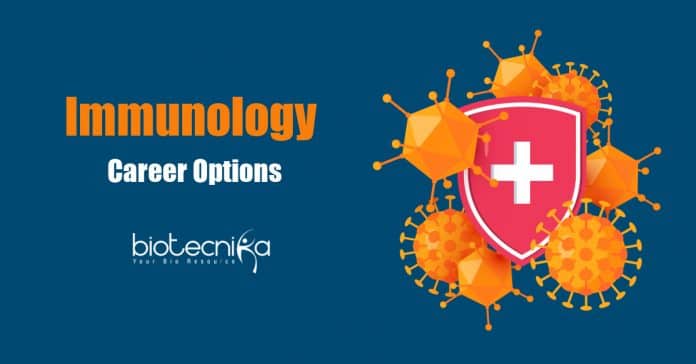Immunology Career Options – How to Build a Career in Immunology?
Immunology is the branch of science that deals with the physical, chemical, and physiological characteristics of the components of an organism’s immune system. It is one of the most important fields in healthcare. The need for antibiotics is increasing every day, so does the demand for immunologists. With the COVID-19 Pandemic lurking around, immunology research has gained much importance than ever. While the whole world is looking forward to an effective vaccine for the novel coronavirus, it is the immunologists who work round the clock to make it possible.
Immunology has a wide range of other applications also in various disciplines of medicine like organ transplantation, virology, dermatology, oncology, parasitology, psychiatry, and bacteriology. Let’s lookout in detail – the Immunology Career Options.
Who is an Immunologist?
An immunologist is a scientist or clinician who specializes in the field of Immunology to study the health of humans and animals through effective yet consistent research. The main role of an immunologist is to examine patients, diagnose, provide treatment to various disorders related to the immune system, plan and perform experiments or studies, organize results, and present reports in seminars, conventional platforms
, and colleges. Immunologists are usually employed by government organizations, healthcare groups, universities, national health services, corporates, pharmaceutical companies, and biotechnological firms.Scope
Graduates specialized in immunology can find a number of job opportunities as immunologists or visiting immunologists in government and private hospitals. Those with doctorate degrees and good experience can get well-rewarded jobs in private hospitals. They can also enter the teaching profession in universities and colleges. Due to the current COVID-19 crisis and realization of the need for immunologists, there will be vast scope for this field in the near future.
Eligibility
A doctoral degree in immunology is the minimum academic qualification to become a researcher in this field. Candidates seeking admission to PhD in immunology should possess a master’s degree or equivalent in life science, medicine or related field. To become a clinical immunologist or allergist, the candidates should have a bachelors degree in medicine (MBBS) and a specialization inmedicine (MD). Those with either a PhD or MD can also enter teaching profession in colleges or universities.
Immunology Courses
For those aspiring for a career in immunology and willing to explore various Immunology Career Options for them – certain courses are available in diploma, post-diploma, bachelor’s, master’s, and doctorate levels. The specializations available in this field include;
- Cancer immunology
- Diagnostic immunology
- Microbiology immunology
- Medical microbiology & immunology
- Reproductive immunology
- Clinical immunology
- Evolutionary immunology
- Allergy & immunology
- Immunology & blood transfusion.
Few top universities offering immunology courses in India are
- IISC
- Jawaharlal Institute of Postgraduate Medical Education & Research (JIPMER), Puducherry
- Sanjay Gandhi Post Graduate Institute of Medical Sciences
- National Institute of Immunology
- St john’s medical college
- M.G.R University
- Vels University, Chennai
- National Institute of Immunology, New Delhi
- Amity University, Noida
- Government Medical College, Surat
Some of the leading colleges that provide immunology post-graduation courses abroad which can open a plethora of Immunology Career options for you ahead are as follows.
- The University of Melbourne, Australia
- The University of Glasgow, UK
- The University of Southern California, USA
- The University of Illinois at Urbana Champaign, USA
- The University of Sydney, Australia
- The University of Iowa, US
Career Opportunities – Immunology Career Options
Scientific Research
One of the most desired aspects of immunology is research. New findings and treatments can be discovered for persistent illnesses because of the many immunologists who research and analyze the immune system. Immunologists in the field of research work in laboratories to study and test interactions of cells, chemicals, and genes in the body to better understand what is necessary for an immune system to function properly. However, for a successful career in immunology research, one would require a PhD degree.
Physicians and Pediatricians
Another very common branch of immunologists is the physicians and pediatricians. Pediatric immunologists, also known as pediatric allergists, find and treat problems related to immune system malfunctions and allergies. They specialize in the treatment of children ranging from infants to teenagers. They usually work in community hospitals, private offices, university medical centers, and children’s hospitals. In addition to specialization in immunology, pediatricians and physicians are required to have a medical degree with many years of training.
College Teaching and Research
Immunologists who are also interested in teaching can find job opportunities in the teaching profession in universities and colleges. They will be instructing students on topics related to immunology while they simultaneously conduct research. To conduct research independently in research laboratories, Ph.D.s and M.D.s typically are necessary. But at least one is always required to secure a position as a member of a faculty or administration.
Salary
- As a fresher, the initial salary of an immunologist would be between Rs. 20,000 – 30,000/month.
- Based on their experience and skills, the salary can increase up to Rs 35,000-50,000.
- Individuals with doctoral degrees in this field can get a salary of Rs. 7 – 8 lakh/ annum.
- In the USA, the salary of freshers in immunology range between $54,880 – $82,320, whereas experienced individuals can get a salary of $215,158 /year. In general, the average salary would be $66,640 to $99,960 /year.
Skills And Responsibilities
With many Immunology Career Options available – Immunologists in the teaching profession should possess skills for instruction and guiding, while Immunologists working in hospitals should have the interest to treat patients of different ages with various immunological diseases. They should be able to maintain good relationships with the patients. A career in immunology is intended for those who are ready to work hard and pursue immense training.
Clinical immunologists have to diagnose and treat patients with immune-related disorders, and they might need to develop new diagnostics tests also. They can either specialize in organ transplantation or the development of vaccines.
Environmental immunologists investigate the effect of natural or chemical substances, especially environmental pollutants, in the human and wildlife immune system and study their response. Some Immunologists analyze the human immune response against viral or bacterial diseases. They would carry detailed research on the pathology of microorganisms and functions of the immune system of humans and animals.
The most important tasks of immunologists are as follows:
- Discover potential biomarkers of diseases
- Utilize data for effective treatment
- Reading suitable scientific literature in this field.
- Improving the conventional techniques to innovate new immunological techniques
- Update the experimental immunology knowledge
- Plan and implement laboratory as well as clinical experiments
- Collaborate with other bench scientists, bioinformatics, geneticist, stakeholder and vendors for a valuable outcome
- Publish protocols of experiments.
Senior immunologists are also entitled to the management of their scientific team. Few important tasks they have to perform are;
- Work with the team to establish the dose, efficacy, and safety of therapeutics.
- Manage the project
- Coordinate and make effective plans for projects
- Maintain the data and records of every project according to the confidentiality regulations
- Maintain, assist and guide the working team
- Advise administrators and communicate with healthcare policymakers by advocacy programs
- Consult the experts if required.
In addition to technical skills, immunologists are also expected to possess sincerity, dedication, willingness to hard work, service spirit to society, patience, discipline, commitment, self-confidence, teamwork skills, self-motivation, adaptation, and flexibility.
The career opportunities in immunology are expected to increase from 15% TO 20% by 2022. So don’t forget to grab the opportunities well.
Immunology Career Options







































I m interested for this job sir/ma’am plzz rply